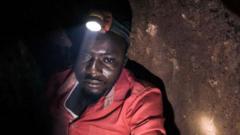DR Congo's government has accused Apple of sourcing minerals tied to armed conflict through its supply chains, prompting legal complaints in Europe. The case shines a light on the ongoing struggles in eastern Congo, where mining activities are linked to human rights abuses and environmental damage.
DR Congo Initiates Legal Action Against Apple Over Conflict Minerals

DR Congo Initiates Legal Action Against Apple Over Conflict Minerals
The Democratic Republic of Congo has filed complaints against Apple in France and Belgium for alleged use of conflict minerals, raising concerns of violence and child labor in mining regions.
The Democratic Republic of Congo (DR Congo) is taking significant legal action against technology giant Apple, filing criminal complaints in France and Belgium. The complaints stem from allegations that Apple is utilizing minerals sourced from conflict-affected areas in the eastern region of the country, which has been marred by persistent violence and human rights infractions linked to armed groups.
Representatives of the Congolese government assert that Apple's operations are contributing to the financing of these groups, which purportedly control many of the mines in the area. The minerals in question—including tin, tantalum, and tungsten—are commonly referred to as "conflict minerals," and the DR Congo's lawyers contend that these are being "laundered" through international supply chains, inadvertently supporting a cycle of violence and oppression. The complaint suggests that these practices have not only financed militias but have also been implicated in child labor and significant environmental degradation.
In its defense, Apple has made efforts to implement a rigorous due diligence framework surrounding the sourcing of its minerals. In a recent review, the company stated that while it does not directly procure minerals, it adheres to high international standards to ensure responsible sourcing practices. Apple has reportedly cut ties with 14 smelters and refiners that could not demonstrate compliance with these standards.
The situation in eastern DR Congo is complicated by the global demand for minerals that serve as critical components in electronic devices. Rights organizations have long highlighted suspicions that not only legitimate mineral sources but also those controlled by armed groups are transported to neighboring countries, including Rwanda, with allegations suggesting that they ultimately appear in consumer electronics worldwide. Rwanda, for its part, has called the Congolese government's claims a media stunt, firmly denying any involvement in the sale of conflict minerals to Apple.
As the judicial authorities in France and Belgium begin to assess the evidence behind these accusations, the international community watches closely, with broader implications for corporate accountability and ethical sourcing practices looming large.























